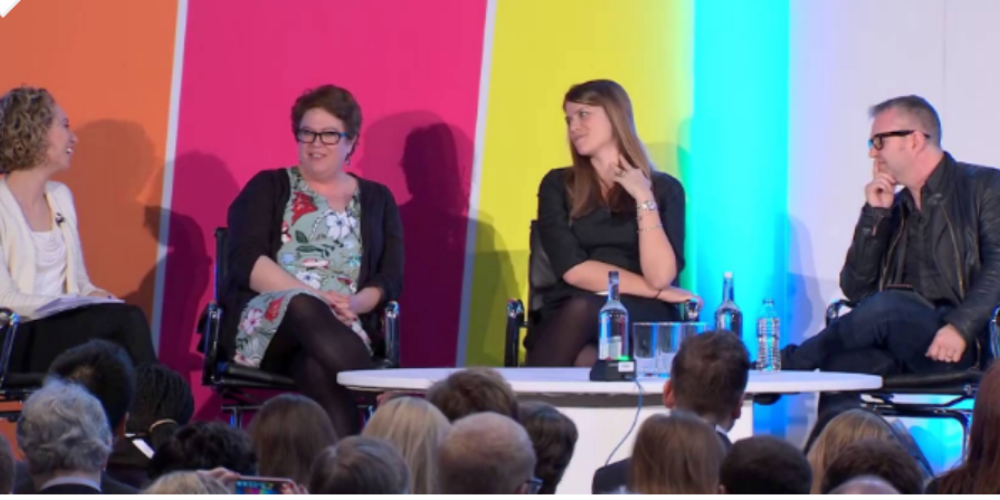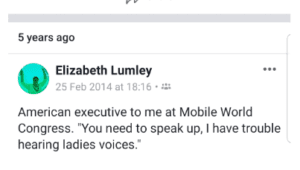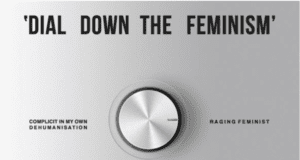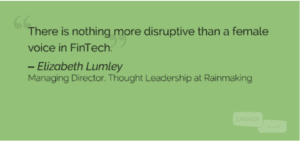
This week a Facebook memory popped up at me. Five years ago, I was at Mobile World Congress – that annual mobile bun fight extravaganza in sunny Barcelona. I was due to interview a client of the company I was working with. He was older, a bit paunchy and American (hey, so am I). Before I even opened my mouth, before our hands touched in a shake, he said these words to me:

May I remind you, dear readers, that I had yet to say a word to this person. He did not preface our meeting with a polite request saying: ‘I am sorry, I am a bit hard of hearing, I hope you don’t mind speaking up during our interview.’ Nor did he wait to hear my dulcet tones, judging for himself whether he could hear me, possibly asking again for a louder voice or a more articulate annunciation.
No, instead he chose to put me in my place.
His first reaction, with me in a public space, was to belittle me.
“You need to speak up, I have trouble hearing ladies’ voices.”
His ears weren’t the problem. (Although high frequency hearing loss is an issue with older people.) It was my voice, my lady voice (which, may I say AGAIN, he had yet to hear) which was the problem. My presence in a public (male) space was going to be an issue for him. He was entitled to this space. I was not. He was older, male, a CEO. He felt no shame, no pause, no ‘think twice’, about saying something like this to me in front of the people who had hired me to do this job. As a woman, it was my duty to adjust, to conform, to compensate for the mere crime of being female in his presence.
Why am I telling this story, now, five years after the fact?
Because I am tired.
For as long as I remember people have commented that I have ‘very strong opinions.’ From my very first *debate* in the first grade over whether Santa Claus did or did not exist (a-hem – I was on the wrong side of reality with that one – but hey, we can’t be right all the time) to penning an Op-Ed in my University newspaper on student loans to today where I often rant away about Open Banking or having to face yet another ‘stale, male and pale’ conference panel (or entire event). I get told I have ‘strong opinions.’
It took me a long time to realise that I don’t have particularly strong opinions in the grand scheme of things. I tend to fall on the side of fixing what is already established – rather than burning the palace to the ground. As you can see from the ‘Great Santa Claus debate of 1976’ I can admit when I am wrong. What I realised was that the issue wasn’t my opinions – but the fact that I have them and I say them in public.
Women are told – from a very young age – to be small, to be quiet, to not take up too much space. To be vocal – to express your views in the public world – is to invite, at the very least, condemnation at the worst, physical attack. One of my favourite pieces of public art in the past few years was a response from artist Alex Bertulis-Fernandes after being told to ‘Dial down the Feminism.’ (Now available in T-Shirt form).

Ask any woman on the internet who dares to ‘have an opinion’ what her DMs look like – never mind what her public feed is fill with. I had one particular exchange last year with someone, in my DMs, where his main beef was that I ‘entered into a thread I wasn’t invited to’. (Don’t worry, we’ve made up now – it’s water under the bridge).
By ‘having strong opinions’ I enter a public space not designed nor reserved for me. To others this is seen as bold. My stance must be strong – or I wouldn’t have expressed an opinion at all. There are others who see who see that stance – writing a blog, sending a tweet, commenting on a news story, expressing an opinion – as a threat, as an attack. This is why I often get asked by other women to ‘please Tweet this for me’ or ‘can you say this’ or ‘write this blog on that’ for me…for us…for other women. So, we don’t get attacked, gaslit and marginalised.
For years I have worked in finance and tech – and been one of very few women (and sometimes the only woman) in the room (or on a panel, or at an event or on an ‘influencer list’). These women see me as someone who can handle the attacks – if they come (and they do come in so many various shapes and levels and forms it is hard to keep track). Because I say things like ‘fuck’ and ‘screw this’ on stage – I am seen as tough.
I am 47 years old in March and I have been in FinTech for 25 years. And I am tired. I am tired of having these same conversations over and over again. I am tired of seeing yet another form of ‘attack’. Women get attacked and dismissed because they are seen as people without status, with no claim to power. That is why, when it isn’t sexual, the attacks centre on our competence. That is why, albeit slowly, things are changing, because more women with power will remember the injustices of ‘centuries of entitlement’ and act.
It was a few years ago, during the very first Innovate Finance Global Summit (IFGS) in London where I said: “This industry loves disruption – well there is nothing more disruptive than a female voice in FinTech.” I meant in in every sense of the word ‘disruption’. When women’s voices are not heard the very sound of it – it’s ladyness – is disruptive. Despite hype and bluster to the contrary – many of us do not react well disruption.

A woman’s voice is not an attack. It is a voice, which you can chose to listen to it or not. But it is entitled to just as much space in the public world of that as a man. I know many women with ‘strong opinions’ but very few who attack people. I have a few rules – that anyone who follows me on social media should know (despite my ‘strong opinions’). Never name people unless you are praising them. Don’t attack individuals – attack ideas. I stick by that – and I have stuck by that. The only Tweets I have ever deleted are due to spelling or grammar errors (which, sadly, I have many).
Recently, there have been insights into just how disruptive and (dangerously ignored) women’s presence in the public world really is. A piece in the New Statesmen by Charlotte Riley on ‘How to play Patriarchy Chicken’ – that’s walking in a straight line, while in public, to you and me – was particularly funny. Honestly, this is a little game I have been playing in London train stations for some time – and you do end up bumping into a lot of men. (It’s sorta fun – if you can take the hits). On the less funny side, a new book that places data to what most of us knew already has been making the rounds of newspaper reviews and Twitter chat. Caroline Criado Perez’s Invisible Women: Exposing Data Bias in a World Designed for Men touches on – in better researched and extensively narrated form – my own reasons for the #NoBarStools Movement.
In the book Criado Perez writes: “…the lives of men have been taken to represent those of humans overall. When it comes to the other half of humanity, there is often nothing but silence. And these silences are everywhere. Films, news, literature, science, city planning, economics, the stories we tell ourselves about our past, present and future, are all marked – disfigured – by a female-shaped “absent presence”. This is the gender data gap.”
For those of you who are wondering, how I responded to this man at MWC five years ago. What I did do was smile, looked him in the eye and shook his hand as I said: “Don’t worry, I have a very loud voice, you just let me know if you can’t hear me.”
I may be tired, but I do have a very loud voice. After 47 years on this earth and 25 years in FinTech – there isn’t much that will make me shut up now. Women are gaining power and validity and exposure – the attacks (whether minor or large) will not drown out the chorus of voices now speaking loudly, not silent and not invisible any more.











